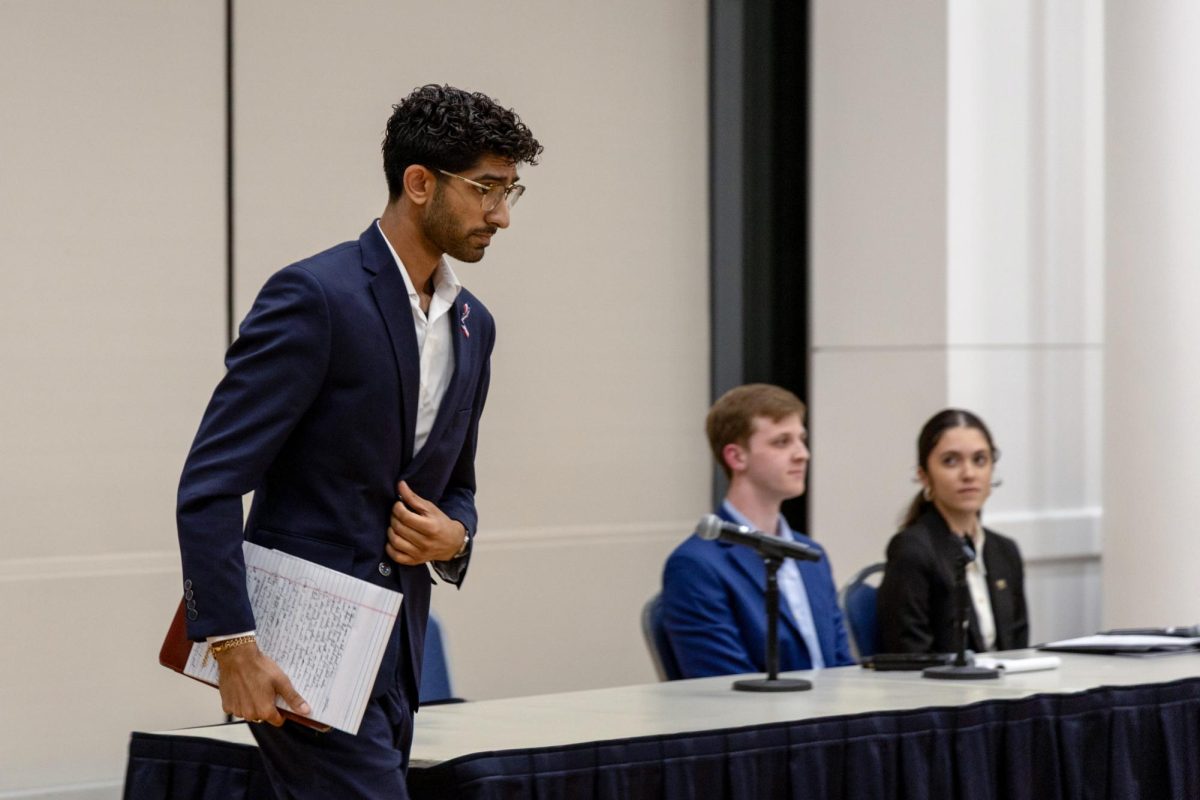“Your Choice, Your Voice, Your SA” was the motto of this year’s Student Association, as Kuyomars “Q” Golparvar won the presidency on issues of change, diversity and advocacy. As the year draws to a close, Golparvar said he believes the SA has become the voice of the students.
“I know the people who elected me were the `average’ students,” Golparvar said. “Students one year later realize the SA is more of an advocate for them.”
But some students say the advocacy campaigns have not hit them.
“I’ve never paid attention to the SA because it’s never affected me,” junior Rich O’Connor said. “That hasn’t changed this year.”
SA Executive Vice President Tony Sayegh said he does not believe the ivory tower was lowered for students this year. While he said the SA has been more visible on campus, he is not sure the average student felt better served by the SA this year.
“I think I can confidently say the SA had a great year,” Sayegh said. “But did the student body feel that? We tried our hardest to make that answer be yes.”
Sayegh said internal struggles in the executive branch may have hindered progress. He said an “unprecedented string of resignations” coupled with a Senate that passed twice as many bills and resolutions as last year’s made it difficult for the executives to fulfill their role of administering and implementing the policies created by the legislative branch.
Sayegh said this year’s Senate benefited from having senators active individually in creating programming in addition to their work inside the Senate.
“The Senate did the lion’s share of the work in the SA this year, as it should,” Sayegh said. “The executive has two elected members in it, the legislative has more than 30. This year’s Senate was more visible than any in my four years at GW.”
Adam Siple, a senator in last year’s SA who worked with the executive branch this year, said the SA included many people without a clear purpose.
“There were still a lot of people that you looked at their mailbox (in the SA office) and wondered who they were.”
Golparvar and Sayegh said their different styles of leadership made working together difficult in the beginning. Both admit those differences have not been resolved, but insist the two branches worked well together.
“Tony and I have very different styles of leadership and he was able to enhance the position of the Senate and make it stronger, which benefited the SA,” Golparvar said.
“(Q) put his heart into the organization; although I would say more than your heart has to go into it as president,” Sayegh said. “(But) I have a different philosophy than Q, and for me to judge him using that as a basis is unfair.
“I have a certain idea of how a president should administer their role and just because that philosophy might differ from Q’s, I’m not saying he did a bad job,” Sayegh said.
Sayegh said he believed the SA was most effective this year when the executive and legislative components worked together.
“The SA is not about the president and vice president,” Sayegh said. “I think the executive and legislative (branches) worked together much better than had been hyped. When the two worked closest together, we had the most successful events.”
Siple said he has seen a change in this year’s SA, but it is not all that people expected it to be.
“We’ve learned that we can do a lot – more effort was made to reach out to people,” Siple said. “But it is far from complete. The expectations coming in were really high, and I don’t think they were met.”
Golparvar points to the outreach of the SA this year as one of its accomplishments, listing his tours of freshman residence halls with freshman senator Marty Claessens as testaments to the SA’s effort to get more students involved and aware of SA activity.
“We worked on informing and educating people on the SA,” Golparvar said. “Unless they know what we do, we can’t help them.”
Sayegh, however, said that the amount of time the SA spends trying to legitimize itself detracts from its ability to advocate for students.
“There’s a constant battle to make the SA legitimate in the eyes of the student body and so much time spent on that campaign,” Sayegh said. “There is not enough time to focus on governance and doing the things that would actually make us legitimate.”
While Golparvar said he realizes the SA can always do better, and more projects that could have been done, he is proud to have stuck to the platform on his campaign.
“Most of what I campaigned on has been addressed in some form, maybe not exactly as it was in my platform, but I did my best to accomplish my goals,” Golparvar said.
Sayegh also said he feels he stuck to his campaign promises, but as he grew into his role, he found more pressing issues that demanded attention. He said he tried to achieve what he promised in his platform, but not at the sake of other issues.
“It is difficult in the limited time we have to govern to accomplish everything and there comes a point when you have to choose and decide to recalibrate your agenda,” he said.






